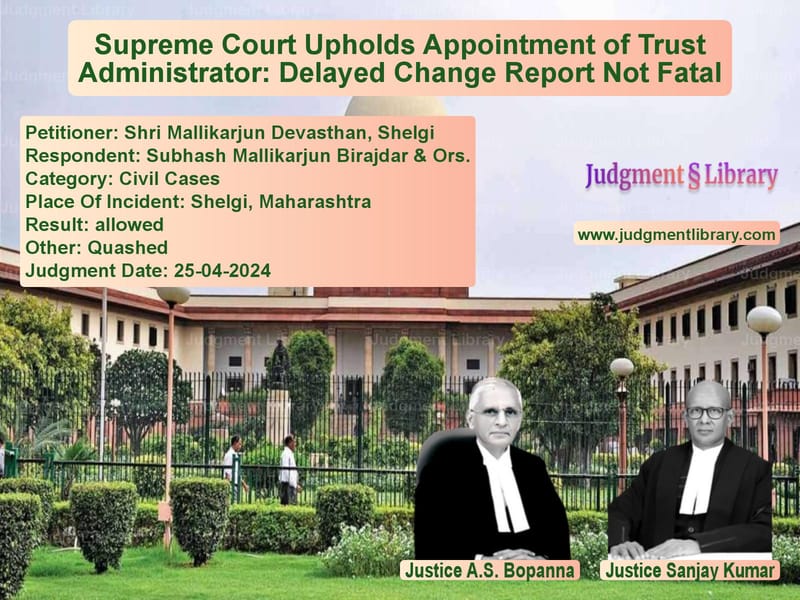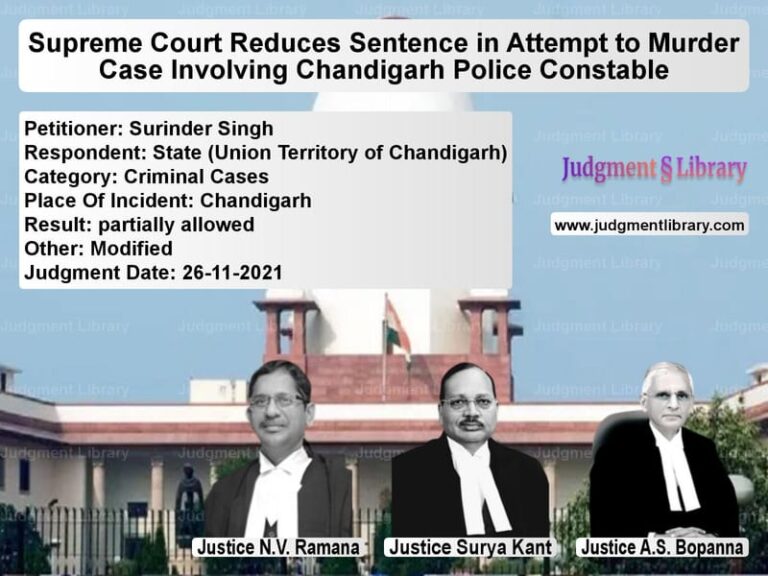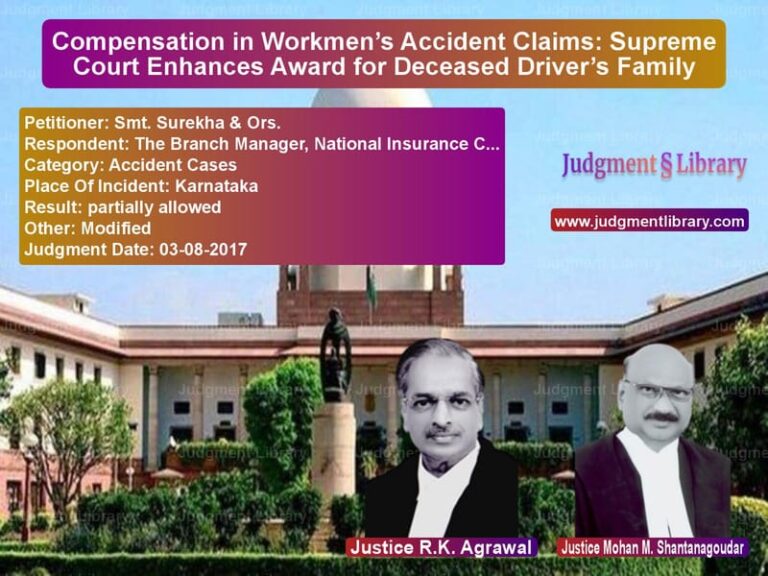Supreme Court Upholds Appointment of Trust Administrator: Delayed Change Report Not Fatal
The Supreme Court of India recently delivered a significant ruling in Shri Mallikarjun Devasthan, Shelgi v. Subhash Mallikarjun Birajdar & Ors., affirming the appointment of a trust administrator despite a delay in filing a change report. The ruling clarifies that procedural delays in updating trust records do not automatically invalidate appointments, provided statutory procedures are eventually followed.
Background of the Case
The case involved the administration of Shri Mallikarjun Devasthan, Shelgi, a public religious trust registered under the Maharashtra Public Trusts Act, 1950. The key events leading to litigation were:
- The trust was initially registered in 1952, with the mode of succession requiring the eldest male member of the founding family to serve as Vahiwatdar (Administrator).
- Following the death of the original administrator in 1992, his eldest son, Ashok Mallikarjun Patil, assumed the role.
- Upon Ashok’s death in 1997, his brother, Jagdishchandra Mallikarjun Patil, took over, despite not being the eldest.
- Jagdishchandra failed to file a Change Report for 17 years, only submitting it in 2015.
- The Deputy Charity Commissioner accepted the Change Report in 2016 without objections, making it final.
- In 2017, Jagdishchandra co-opted four new trustees and filed another Change Report, which was also approved.
- A group of devotees challenged these appointments in the Joint Charity Commissioner’s court, arguing procedural lapses.
- The Commissioner upheld the appointments, but the Bombay High Court later ruled that the delay in filing the Change Report invalidated them, remanding the case for reconsideration.
This prompted an appeal to the Supreme Court.
Arguments by the Appellant (Shri Mallikarjun Devasthan, Shelgi)
- The trust argued that the delay in submitting the Change Report was a procedural lapse, not a substantive illegality.
- They contended that under Section 22 of the Maharashtra Public Trusts Act, 1950, a delayed Change Report does not invalidate an appointment unless fraud is proven.
- The delay was condoned by the Deputy Charity Commissioner, and no objections were raised at the time.
- The trust also pointed out that the new trustees had already been functioning and ensuring proper administration.
Arguments by the Respondents (Opposing Devotees)
- The respondents argued that the trust’s failure to report changes for 17 years constituted a violation of trust management principles.
- They contended that the appointment of Jagdishchandra was invalid as it did not follow the prescribed succession rule.
- The High Court’s ruling was correct in ordering a fresh inquiry into the matter.
Key Observations of the Supreme Court
- The Supreme Court emphasized that procedural lapses, such as a delayed Change Report, do not automatically invalidate appointments.
- The Court noted: “Failure to file a Change Report within the prescribed period does not, by itself, nullify an appointment. The law provides for condonation of such delays.”
- It highlighted that no objections were raised at the time of the Change Report’s acceptance, making the High Court’s intervention unnecessary.
- The Court rejected the claim that Jagdishchandra’s appointment was improper, noting that his elder brother had willingly renounced the role.
- The Court ruled that the High Court’s order remanding the matter for fresh consideration was unnecessary and legally flawed.
Final Judgment
The Supreme Court allowed the appeal and issued the following directives:
- The Bombay High Court’s ruling was quashed.
- The Change Reports of 2015 and 2017 were confirmed.
- Jagdishchandra and the four co-opted trustees were recognized as the valid administrators of the trust.
- Any pending applications related to the matter were dismissed.
Implications of the Judgment
- The ruling reinforces that procedural delays in filing Change Reports do not automatically invalidate trust appointments.
- It sets a precedent that courts should not interfere in trust administration unless there is evidence of fraud or gross mismanagement.
- The judgment ensures continuity in trust administration, preventing disruptions due to technical lapses.
- It clarifies the powers of Charity Commissioners in condoning delays and maintaining trust records.
Conclusion
The Supreme Court’s decision in Shri Mallikarjun Devasthan, Shelgi v. Subhash Mallikarjun Birajdar is a landmark ruling in trust law. By affirming that procedural delays do not invalidate legitimate appointments, the Court has ensured that trusts can function without undue disruptions. The judgment provides clarity on the role of the Charity Commissioner and protects the interests of religious and charitable institutions from frivolous litigation.
Petitioner Name: Shri Mallikarjun Devasthan, Shelgi.Respondent Name: Subhash Mallikarjun Birajdar & Ors..Judgment By: Justice A.S. Bopanna, Justice Sanjay Kumar.Place Of Incident: Shelgi, Maharashtra.Judgment Date: 25-04-2024.
Don’t miss out on the full details! Download the complete judgment in PDF format below and gain valuable insights instantly!
Download Judgment: shri-mallikarjun-dev-vs-subhash-mallikarjun-supreme-court-of-india-judgment-dated-25-04-2024.pdf
Directly Download Judgment: Directly download this Judgment
See all petitions in Property Disputes
See all petitions in Succession and Wills
See all petitions in Specific Performance
See all petitions in Judgment by A. S. Bopanna
See all petitions in Judgment by Sanjay Kumar
See all petitions in allowed
See all petitions in Quashed
See all petitions in supreme court of India judgments April 2024
See all petitions in 2024 judgments
See all posts in Civil Cases Category
See all allowed petitions in Civil Cases Category
See all Dismissed petitions in Civil Cases Category
See all partially allowed petitions in Civil Cases Category






